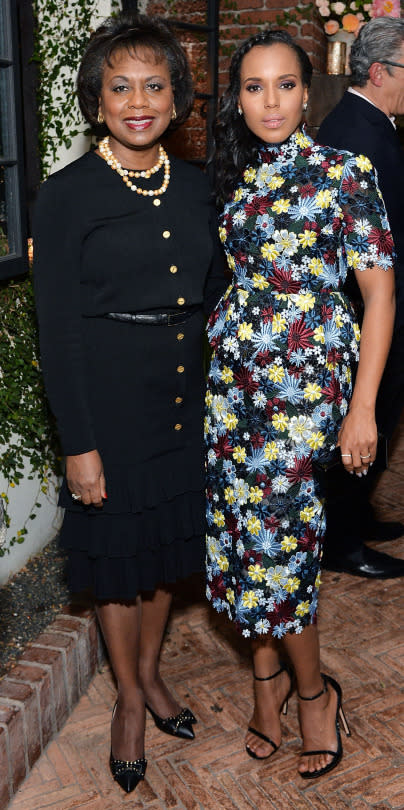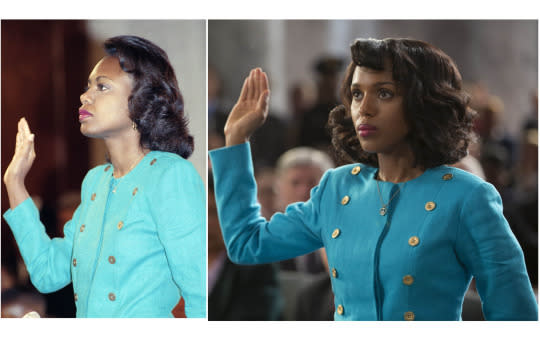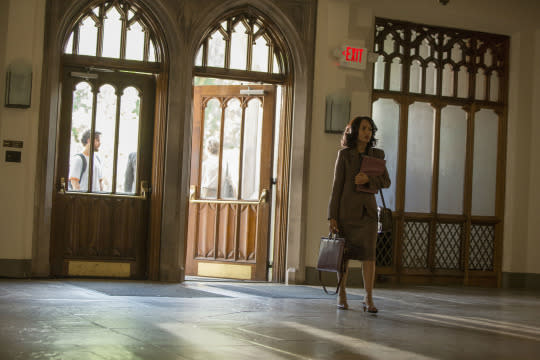The Legacy of Anita Hill: HBO’s ‘Confirmation’ Shows How the Country Started Talking About Sexual Harassment

Anita Hill and Kerry Washington. (Photo: Getty Images)
In a new HBO film, Kerry Washington plays Anita Hill, the attorney who went up against Clarence Thomas — and thrust sexual harassment into the national spotlight. But how much has changed in 25 years?
Confirmation — about the seismic 1991 sexual harassment allegations against Supreme Court nominee Clarence Thomas by Hill, a former employee — so seamlessly weaves together actual and fictional material that the first thing I did when I got home from the screening was stay up far too late watching the original hearings. Even more than the film, which airs April 16, Hill’s actual testimony elicits awe and outrage: Her reserved, businesslike demeanor signaled that she took no pleasure in the public spotlight. (In fact, the private testimony against Thomas she had given to the FBI, after having been approached by Senate staffers asking her to do so, had been leaked to the press. Only then were Thomas’s confirmation hearings reopened and Hill called to Washington to testify.)
Yet here was this poised and dignified woman — a University of Oklahoma law professor and, like her former boss Thomas, an African-American graduate of Yale Law School — facing a panel of 14 white men, being called “a woman scorned” with “a martyr complex” (by late Alabama Sen. Howell Heflin) and asked repeatedly why she stayed on working for Thomas amid the harassment that she alleged included repeatedly asking her out on dates even when she declined the first time, relating to her the content of bestiality and gang-rape porn films he watched, boasting of his sexual prowess and — in perhaps the hearing’s most unfortunately indelible image — asking her who put a pubic hair on his can of Coke.
Ultimately, as the HBO film dramatizes, Hill’s testimony did not stop Thomas’s confirmation to the Supreme Court, where for 25 years he has consistently ruled against women’s rights. His fellow Republicans mounted a vicious smear campaign against Hill, branding her as oversexed and crazy and cowing the confirmation committee, helmed by Sen. Joe Biden, D-Md., into not calling additional willing witnesses — including journalist Angela Wright (played by a pissed-off Jennifer Hudson), who had her own allegations against her former boss, Thomas — who might have vindicated Hill and blocked Thomas.

From left: Anita Hill being sworn in (1991); Kerry Washington, playing Hill in the new HBO movie, Confirmation. (Photos: AP; Getty Images)
Heartbreakingly, the film depicts Hill’s deep conviction that though she came forward on principle, she would not be believed and that both her career and those of her colleagues would be badly hurt. Polls at the time showed that the vast majority of Americans believed Thomas (who denied all allegations), and one of the film’s toughest scenes is when Hill, beaten down by the media glare, shuts down her legal team, saying, “I want to go home.”
But in a moving scene toward the end, the film makes clear the legions of women at the time who knew exactly what Hill was talking about when she described her harassment and the career survivalism that motivated her to endure it or to not come forward earlier when she could have kept Thomas from lower government positions.
And, of course, Hill has been vindicated since then. The book Strange Justice: The Selling of Clarence Thomas, by Jane Mayer and Jill Abramson, published three years after the hearings, revealed much evidence in her favor. But, even more significant, when it comes to the issue of sexual harassment, Hill’s name has become synonymous with a before-and-after moment. Before Hill, though the law technically forbade it, sexual harassment in the workplace — especially when it involved a hostile work atmosphere (such as sexual talk or cartoons on the wall) and not just overt touching or propositions — wasn’t something many Americans understood clearly. To men, it was just having fun on the job, something women should “lighten up” about; and to far too many women, it was simply something to be endured, an inevitable headache for working women.
After Hill, that changed. Harassment complaints to the Equal Employment Opportunity Commission — the very D.C. agency where Hill worked for Thomas— skyrocketed. Laws were strengthened. In 1992, an unprecedented number of women were elected to Congress — partly because, many said, of the infuriating spectacle of Hill’s having to explain herself before a panel of 14 white men.

Photo: Courtesy HBO
But more than all that, the discourse changed — and continues to change. It was difficult to watch Confirmation without thinking about how, if the Thomas-Hill incident happened today, social media would explode with women’s voices from all over the world echoing Hill’s experience. The essence, the fundamental truth, of what she was describing would be irrefutable. In 1991, the only outlets for full-throated outrage on the issue were a handful of left-leaning publications like Ms. or The Village Voice. Otherwise, everyday women were left to echo Hill’s words in private, among themselves, still fearful — as was she, rightly so — of retaliation.
It’s not, of course, that workplace harassment still doesn’t happen. Studies in recent years make that clear. In other arenas of life, such as college campuses, women and men continue a difficult conversation about what constitutes sexual harassment or assault and the role of institutions in preventing or adjudicating it. In a 2013 interview, Hill — today a professor at Brandeis and a prolific writer — said that the bulk of change since 1991 has been the willingness of women to come forward, not the readiness of institutions to prevent or deal with harassment.
Like Hill herself, Confirmation is somewhat reserved, procedural — dutifully relying more on facts and narrative than emotions to make its case. In the film, two young female Democratic Senate staffers watch Hill’s testimony. “Should she be more emotional?” asks one. “If she were, we’d say she should be less emotional,” replies the other. Hill’s own lack of appetite for the drama of the hearings underscores her quiet but firm conviction that she had a duty to come forward with her story.
Interestingly, the most moving moment of the film might be when Hill enters the packed, media-crowded hearing room followed by her parents and several other family members from Oklahoma. It’s a poignant reminder that the woman whom Republicans and much of the media branded as “a little bit nutty and a little bit slutty” was a human being, a highly qualified professional, with her own family life, who had made the difficult decision to forfeit her privacy, peace of mind, and even her professional reputation in the name of speaking out against sexual harassment. For anyone who remembers the original hearings — and especially for those who do not — Confirmation is a riveting account of how far we’ve come since the day Anita Hill came forward … and how far we have to go.
Follow us on Facebook, Instagram, and Pinterest for nonstop inspiration delivered fresh to your feed, every day.